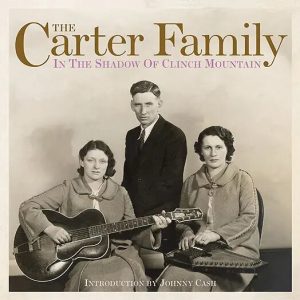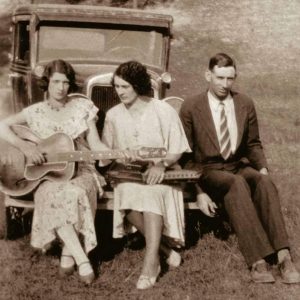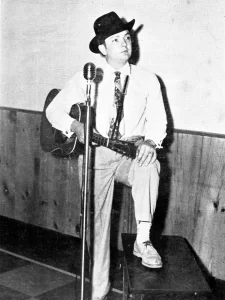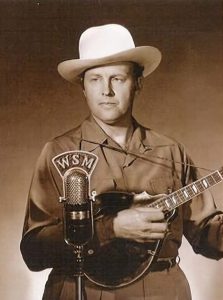De vier CD’s met deze opnamen hebben vanaf 2004 in één van de lades van mijn bureau gelegen. Tijdens het voorbereiden van een post als deze ben je natuurlijk intensief met de tekst bezig. Dat is Kees Jansen indertijd ook geweest toen hij de oorspronkelijke transcriptie maakte. Ik ben vooral onder de indruk van de verhalen over de vriendschap tussen Bill Clifton en A.P. Carter. In het vorige deel (# 6) konden we daar al iets over lezen; nu meer antwoorden op meer vragen…
Questions and answers
Transcriptie:
 He was always and foremost a professional musician. Yeah, always the professional attitude.
He was always and foremost a professional musician. Yeah, always the professional attitude.
I read in the book that was with the Bear Family CD-box that you did some radio shows together with A.P.? I was wondering, are there any tapes from that? No. They were all done live.
No one was recording? No. Nobody recorded anything. We always did everything live. In fact I preferred, I always preferred live radio. Because it’s there and it’s gone and that’s that. So, it won’t be perfect, maybe, but if you break a string on a guitar well you just change it and you talk a little bit. And that’s real, that’s the way it happens.
 But still: it’s a pity. Because recordings of you two together, you know? Yeah, I would love to have them myself. One of the things with A.P., I never… We shared a lot silently. We didn’t always talk a lot, you know. And I never asked him anything. He would talk to me a lot and he would teil me a lot of things. It’s just a few years ago when Janette and I were talking. She talked about a particular person who had come to Maces Springs to talk to daddy. And she said he was an academic person, and he was writing papers on The Carter Family to present to the folk music community. And he was from California. Well, if you said his name I’d know it but I don’t remember it, I’ve never met him. But he came and she said: ‘He asked daddy all kinds of questions’. And she said: ‘Daddy just shook his head and didn’t speak to him. And so, later on, the interview was kind of ended because there wasn’t any of communication. And daddy walked into my room’ she said. ‘And he said: Now Janette, this fellow has a lot of questions he wants to ask: you don’t need to answer any of them’. I said: ‘that’s really stranger ‘cause your daddy talked to me all the time’. And she said: ‘Yeah. You know why he talked to you all the time? Because you never asked him anything. But he wanted you to know’.
But still: it’s a pity. Because recordings of you two together, you know? Yeah, I would love to have them myself. One of the things with A.P., I never… We shared a lot silently. We didn’t always talk a lot, you know. And I never asked him anything. He would talk to me a lot and he would teil me a lot of things. It’s just a few years ago when Janette and I were talking. She talked about a particular person who had come to Maces Springs to talk to daddy. And she said he was an academic person, and he was writing papers on The Carter Family to present to the folk music community. And he was from California. Well, if you said his name I’d know it but I don’t remember it, I’ve never met him. But he came and she said: ‘He asked daddy all kinds of questions’. And she said: ‘Daddy just shook his head and didn’t speak to him. And so, later on, the interview was kind of ended because there wasn’t any of communication. And daddy walked into my room’ she said. ‘And he said: Now Janette, this fellow has a lot of questions he wants to ask: you don’t need to answer any of them’. I said: ‘that’s really stranger ‘cause your daddy talked to me all the time’. And she said: ‘Yeah. You know why he talked to you all the time? Because you never asked him anything. But he wanted you to know’.
And the other guy was prodding him with questions? Yeah! And he thought, you know…


Was he ever aware of his big influence on music? Oh Yeah! Very much aware. He really was. It didn’t come in awareness by royalty checks. Because the royalty checks got smaller and smaller. But it came in an awareness of the fact that, I guess, there were people out there… I mean, he was forty years older. Exactly forty years older than I am. I was eighteen when I met him and he was fifty-eight. All right, well, not too many eighteen-year-old boys are running around, leaning things from fifty-eight year old men who aren’t even playing music anymore. They’re just running a little country store, grocery store. And I guess part of that awareness came through the fact that: here’s some young guy who wants to know all about my music. He’s very enthusiastic, he’s very, I had a lot of energy in those days, I don’t have it anymore but I was full of energy then, and I didn’t have any interest outside of that. I mean really, I think a lot of the band members, we were talking about something like this a while ago which surprised me, a lot of the band members thought: ‘well, he never has a date, he never goes out with anybody…, you know’. But my whole thrust was music; I was just interested in that. And I think that A.P. was very aware that I was that way, just like Carter Stanley was aware of that. I mean, when I first met Carter and Ralph Stanley, Carter became an immediate friend. Because I was some- body outside of the region. I didn’t come from the same place that they did. And I don’t mean just to say geographical place, I was the next state away. I wasn’t speaking of that, I wasn’t from the same place that they were sociologically speaking either. I wasn’t raised in the same way and I didn’t have the same kind of background. And so I was not a threat. I mean, I was not somebody that they felt threatened by, in any way. And yet, I think that they saw the energy and they saw the interest was real. So they shared. I mean, Carter also shared an awful lot of information, I mean Carter Stanley, shared a lot of information with me that he didn’t share with anybody else. But he would teil me a lot of things and when I needed a banjo player for a recording session he said: ‘Take Ralph’. Ralph didn’t offer, you know, but Carter said: ‘Take Ralph’. And so I did. But it was one of those things that… And then also those people had friends who were important people. Like Carter was a very… Carter was one of the very few, probably the only, former Bluegrass Boy that had made it on his own, musically speaking, who Bill spoke to. Bill wouldn’t speak to Mac Wiseman, he wouldn’t speak to Lester or Earl…
That feud’s notorious… Yeah, he wouldn’t speak to any of them, you know. Until 1961. Then I got him up to Lurray, Virginia. And I told him, I said: ‘Bill, I’m gonna have Mac and I’m gonna have Carter and I want you to do some songs with him’. ‘Well, if you say so, I will’. And he did. But that’s the first time that he ever played with any former Bluegrass Boys. But he liked Carter Stanley, he always liked Carter and he liked me for some reason. And I think the reason he liked me was because Carter liked me and Carter had told him I was okay.

Ik har mit tonge onder de schounzolen lopen om A.P. te heuren proaten, net as ik mit Cash doan had. Bin nooit goan Monroe fan west, moar wel een heul mooi verhoal! Vogeltje ‘Big Bird’, wie hebben geschiedenis schreven mit dit gebeuren!
D’r zijn volgens mij maar een paar LP’s waarop te horen is dat A.P. Carter praat. Ik herinner me eentje van de Phipps Family waar A.P. de aankondiging doet. Maar verder ben ik het volledig met je eens. Ik hoor onze vragen en de manier waarop Bill z’n antwoorden zorgvuldig formuleert en bedenk me dan dat ik het erg indrukwekkend vind allemaal. En dan te bedenken dat er maar één handdruk zit tussen ons en A.P. Carter; dat is toch wat…
Dei LP’s ken ik. Ik heb ze op CD loaten zetten. Dei handdruk dut hom het echt Harry!!
Dat van die handdruk heb ik lang geleden een keer gelezen. Ik vond het wel een mooie gedachte. Ik heb Ralph Stanley bijvoorbeeld nooit zien/horen optreden, maar ‘k ben slechts één handdruk van de man verwijderd. Mooie gedachte toch?